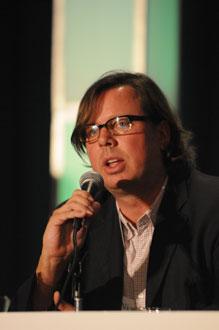Tulane Business Forum looks at leveraging resources
The Receivables Exchange was founded to connect small- and mid-size businesses in need of working capital with investors, but according to president and co-founder Nicolas Perkin, the biggest innovation the New Orleans-based company brought to factoring wasn’t creating a transparent marketplace for buyers and sellers of commercial receivable. It was enabling buyers to apply the same risk-management principles to receivables that they apply to the rest of their portfolios.

“Buyers can take 1 percent of 100 different auctions across 100 different industries,” said Perkin (TC ’94). “If you’re going to go buy stock, you’re not going to put all your money in IBM. You don’t do it in any asset class, why would you do it in this asset class? That’s really the fundamental principle of the innovation we think we’ve brought to the table.”
That unique innovation has helped to fuel 300 to 400 percent annual growth at the company, which Perkin said is in the early stages of a preparing for an IPO.
Perkin talked about the evolution of the Receivables Exchange and the current business landscape as part of a panel discussion on alternative capital markets at this year’s Tulane Business Forum. The forum, an annual presentation of the Tulane Association of Business Alumni (TABA), took place at the Sheraton New Orleans Hotel on Oct. 8. This year’s program focused on the theme “Leveraging Corporate Resources,” and more than 650 people attended the forum to hear some of the ways that innovative businesses and business leaders are doing more with less.
Robbie Vitrano, co-founder and chairman of marketing firm Trumpet, told the story of Naked Pizza, which has used social media to grow from a single store in New Orleans to an international business with 400 stores in development in locations as far away as Dubai and Istanbul.
“We used [social media] as a way to get people interested in our idea, primarily using Twitter and Facebook to distribute this conversation in a way that allowed Naked Pizza to acquire two billionaire investors and more than 5,000 franchising inquiries,” Vitrano said. “It allowed for media to get a hold of this idea and start to distribute it. While we were just one location, were were in the Wall Street Journal, the New York Times and blogs around the world. In essence, it allowed us to validate the concept.”
Vitrano added that the low cost and wide reach of social media platforms makes them an ideal tool for businesses to find out what ideas work in a cost-effective way.
“Conceivably, that should favor a place like New Orleans, which isn’t New York or Silicon Valley but which certainly has Net intelligence and Net ingenuity,” he said.

The forum kicked off with a presentation by Charles N. Kahn III, president and CEO of the Federation of AmericanHospitals, who walked attendees through the process of how health reform was enacted and what it will mean for business. Kahn was followed by Vitrano and John Winsor, CEO of Victors & Spoils, a marketing firm based in Boulder, Colo., that, like Trumpet, is using social media technology to accomplish things that previously would have been unthinkable for an agency with just 10 employees.
Joining Perkin on the alternative capital markets panel were J. Marshall Page III, a partner at Jones Walker, and Christopher J. Perry, president and global head of Thomson Reuters Trading Focus Accounts. The panel was moderated by Peter Ricchiuti, assistant dean at the Freeman School and research director of the Burkenroad Reports program.
David Brain (A&S ’78, MBA ’79), president and CEO of Entertainment Properties Trust, a NYSE-traded REIT that focuses on megaplex movie theatres and entertainment retail centers, followed the capital markets discussion with a presentation on the often misunderstood concept of off-balance-sheet financing.

The forum concluded with a luncheon keynote presentation by Dean E. Taylor (A&S ’71), chairman, president and CEO of Tidewater Inc. Taylor’s presentation focused on distinguishing your company in a commodity industry, and one of the key elements to achieve that goal, he said, is having the right people in place. To illustrate his point, Taylor showed a video that told the inspiring story of Tidewater’s Damon B. Bankston supply boat, whose crew rescued 115 people from the waters of the Gulf of Mexico following the explosion and fire aboard the BP Horizon oil rig.
“That’s something about which I’m immensely proud,” Taylor said. “They didn’t do it for glory. They didn’t do it for any other reason than it was the right thing to do. That’s typical of so many people in our industry that do what they do because they feel like it’s the right thing to do.”
Interested in advancing your education and/or career? Learn more about Freeman’s wide range of graduate and undergraduate programs. Find the right program for you.
Other Related Articles
- Alumna leverages Freeman network to land dream job at Entergy
- Alumna recalls trailblazing career in business, ministry
- Students network their way through Manhattan in annual Real Estate Trek
- Futurist series highlights consumerization of health care
- DW News: Can the Fed stay independent under Trump?
- Snapping Back: Alumna is HP’s guardian against disruption
- Goes highlights growth, AI initiatives in ‘State of the School’ address
- NOLA.com: Louisiana venture capital firms, once an afterthought, are big funders of local startups now
